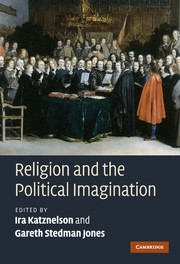Book contents
- Frontmatter
- Contents
- List of contributors
- Acknowledgements
- Introduction: multiple secularities
- 1 Secularisation: religion and the roots of innovation in the political sphere
- 2 Regarding toleration and liberalism: considerations from the Anglo-Jewish experience
- 3 The Enlightenment, the late eighteenth-century revolutions and their aftermath: the ‘secularising’ implications of Protestantism?
- 4 In the lands of the Ottomans: religion and politics
- 5 The Russian Orthodox Church and secularisation
- 6 The American experience of secularisation
- 7 French Catholic political thought from the deconfessionalisation of the state to the recognition of religious freedom
- 8 Religion and the origins of socialism
- 9 From 1848 to Christian Democracy
- 10 The disciplining of the religious conscience in nineteenth-century British politics
- 11 Colonial secularism and Islamism in North India: a relationship of creativity
- 12 The 1960s
- 13 Gendering secularisation: locating women in the transformation of British Christianity in the 1960s
- 14 Does constitutionalisation lead to secularisation?
- 15 Europe's uneasy marriage of secularism and Christianity since 1945 and the challenge of contemporary religious pluralism
- 16 On thick and thin religion: some critical reflections on secularisation theory
- Index
12 - The 1960s
Published online by Cambridge University Press: 05 June 2012
- Frontmatter
- Contents
- List of contributors
- Acknowledgements
- Introduction: multiple secularities
- 1 Secularisation: religion and the roots of innovation in the political sphere
- 2 Regarding toleration and liberalism: considerations from the Anglo-Jewish experience
- 3 The Enlightenment, the late eighteenth-century revolutions and their aftermath: the ‘secularising’ implications of Protestantism?
- 4 In the lands of the Ottomans: religion and politics
- 5 The Russian Orthodox Church and secularisation
- 6 The American experience of secularisation
- 7 French Catholic political thought from the deconfessionalisation of the state to the recognition of religious freedom
- 8 Religion and the origins of socialism
- 9 From 1848 to Christian Democracy
- 10 The disciplining of the religious conscience in nineteenth-century British politics
- 11 Colonial secularism and Islamism in North India: a relationship of creativity
- 12 The 1960s
- 13 Gendering secularisation: locating women in the transformation of British Christianity in the 1960s
- 14 Does constitutionalisation lead to secularisation?
- 15 Europe's uneasy marriage of secularism and Christianity since 1945 and the challenge of contemporary religious pluralism
- 16 On thick and thin religion: some critical reflections on secularisation theory
- Index
Summary
Historians of the future may come to rank the 1960s alongside the 1520s and the 1790s among the great revolutionary decades of Europe's religious history. Indeed, the religious significance of the 1960s is even wider, since equally radical changes were taking place in North America and Australasia. And the atmosphere of the 1960s also had much in common with that of those other revolutionary decades. History moved faster during these years, and a dynamic of change built up which old institutions and traditions were powerless to withstand. For some people, a new era of apparently limitless possibilities was opening up. As in many other periods, the rebels and nonconformists had an influence out of proportion to their numbers. However, this was also a period of profound yet unspectacular social changes. In focussing on flamboyant manifestations of the counter-culture or the most trenchant forms of political radicalism, there is a danger of overlooking more mundane developments which were changing the lives even of the conventional majority.
The importance of the 1960s in the religious evolution of the western world is widely recognised and there is a growing body of historical and sociological literature describing and explaining the changes in that period. There is also considerable agreement as to the main directions of change at that time, in spite of significant differences of emphasis. But there is no consensus at all as to the causes of change.
- Type
- Chapter
- Information
- Religion and the Political Imagination , pp. 254 - 274Publisher: Cambridge University PressPrint publication year: 2010

